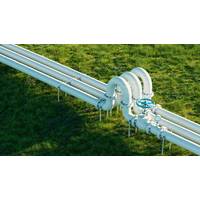Miners Lock in Shipping Costs as Freight Market Recovers
- Dry bulk shipping market prospects improving
- Time charter deals on ships becoming more attractive
Global miners and commodity traders are using multiple strategies to lock in favourable rates for shipping costs, anticipating a freight market recovery after years of turmoil.
Ship owners ordered large numbers of vessels between 2007 and 2009, just as the global economy sank into crisis. Prospects have brightened in recent months, with a pickup in global trade helping to absorb the ship glut.
Iron ore deliveries to top consumer China are up 21 percent in the first four months of 2014 against the same period last year and are expected to rise further as major suppliers boost output and Chinese mills switch from lower quality domestic ore to higher grade and less polluting imports.
This is likely to bolster demand for larger capesize ships. Dry bulk shipping activity, involving the transport of major commodities such as coal and iron ore, is often taken as a leading indicator of overall global economic health.
"In addition to iron ore import prices being poised to stay well below last year's levels, consuming a larger proportion of imported iron ore over domestic iron ore remains in the best interest of China's environment. This is very encouraging for capesize prospects," said Jeffrey Landsberg of U.S. consultancy Commodore Research.
Anglo American, the world's fifth largest diversified miner, is among mining companies and trade houses adapting their shipping strategies including hiring capesize ships for longer periods, known as time charters.
Last year Anglo created a shipping division for iron ore, coal and metal products as part of its new commercial hub in Singapore, aiming to take more control of its logistics. The group is also trading third-party materials, to make sure every vessel is filled and utilised more efficiently.
"The three new aspects to our shipping strategy are the increasing expansion from iron ore to the broader bulk markets to include met coal and thermal coal cargoes, the move from FOB (free-on-board) to CIF (cost-insurance-and-freight) volumes and the move from point to point to time charters," said Anglo American's head of commercial services Heike Truol.
"It is early days but we are watching where the market is going, to take advantage of opportunities, while also starting to look at using a broader set of tools, including bunker hedging and forward freight agreements (FFAs)."
FFAs enable investors to take positions on freight rates at a point in the future. Since companies like Anglo are moving from longer-term fixed freight prices to shorter-term spot rates, FFAs allow better control of risk exposure.
"We do use FFAs as a price management tool," a spokesman at Rio Tinto (RTNTF) said. "We also constantly monitor the market and the uplift in freight rates following on from the conditions of recent years is built into our plans."
A spokeswoman with trader Vitol said it relied on time charters for transporting dry bulk commodities and used FFAs to "manage price risk".
Buying Ships
In recent months global players in commodities have also begun to buy more ships aiming to capitalise on weaker vessel values ahead of an upturn.
Data from maritime analysis firm VesselsValue.com showed the price of a newbuild capesize vessel peaked at over $200 million in June 2008 and fell to a record low of $38 million in December 2012. Values have now crept up to just over $60 million.
Cargill, one of the world's leading commodity companies, has said its decision to buy capesize vessels via a joint venture was an "asset play" aimed at taking advantage of softer prices, adding it had no plans to become a long-term ship owner.
Rio Tinto, the world's second-largest diversified miner, has also purchased eight ships, the latest of which was delivered in December, taking its total fleet to 17.
"We both own and charter vessels, although our freight requirements mean that we charter far more than we own," the spokesman said, adding that Rio Tinto moved almost 200 million tonnes of dry bulk cargo in 2013.
Rio and rivals BHP Billiton (BHPLF), Brazil's Vale and Australia's Fortescue Metals aim to add more than a combined 150 million tonnes of iron ore production in 2014 - and most will be delivered to China.
"In our view, Q4 will be the marker for the beginning of a proper, sustainable rally of the capesize market, and with it pull rates for other assets upwards," said Marc Pauchet, with brokers ACM Shipping.
(By Jonathan Saul and Silvia Antonioli, Additional reporting by Dmitry Zhdannikov; Editingby Veronica Brown and David Evans)

